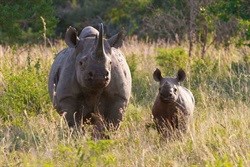






The figures released by the South African Department of Environmental Affairs (DEA) show that 1,215 rhinos were illegally killed in 2014, an increase of 21% on the 1,004 animals lost in 2013.
The Kruger National Park, which holds the majority of the country's rhinos, remains the epicentre of illegal activity with 827 rhinos lost throughout the year, representing nearly two-thirds of all animals killed. South Africa is home to approximately 20,000 rhinos - more than 80% of the world's rhinos.
South Africa can boast of a number of recent law enforcement successes with the DEA announcing 386 rhino crime-related arrests in 2014. However, continued targeted efforts are required.
"There is no single solution to this complex global crisis," acknowledged Dr Jo Shaw, Rhino Programme manager for WWF SA. "In 2015, we need to keep working together on the strategic interventions which will have the greatest impact and result in greatest benefits for our rhinos."
WWF South Africa's Rhino Programme is built around a strategic five-point framework for supporting rhino conservation, namely:
"Rhino poaching is now recognised on the international stage as a symptom of growing involvement of sophisticated transnational criminal syndicates in the trafficking of wildlife products. We recognise that this battle impacts our national security and economy and will need everyone to work together to combat these threats if we are to achieve a tangible reduction in rhino losses," Dr Morné du Plessis, CEO of WWF SA said.